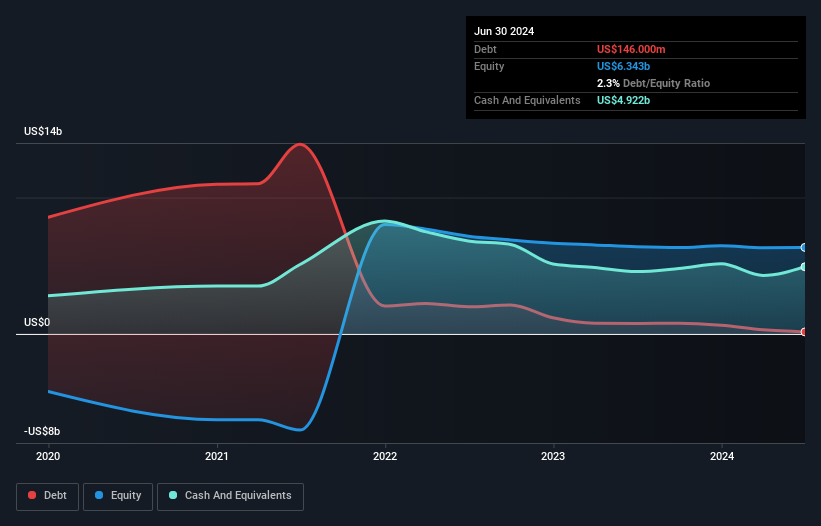- United States
- /
- Transportation
- /
- NasdaqGS:GRAB
Grab Holdings (NASDAQ:GRAB) Has Debt But No Earnings; Should You Worry?

David Iben put it well when he said, 'Volatility is not a risk we care about. What we care about is avoiding the permanent loss of capital.' So it might be obvious that you need to consider debt, when you think about how risky any given stock is, because too much debt can sink a company. Importantly, Grab Holdings Limited (NASDAQ:GRAB) does carry debt. But the real question is whether this debt is making the company risky.
Why Does Debt Bring Risk?
Generally speaking, debt only becomes a real problem when a company can't easily pay it off, either by raising capital or with its own cash flow. Part and parcel of capitalism is the process of 'creative destruction' where failed businesses are mercilessly liquidated by their bankers. However, a more frequent (but still costly) occurrence is where a company must issue shares at bargain-basement prices, permanently diluting shareholders, just to shore up its balance sheet. Of course, the upside of debt is that it often represents cheap capital, especially when it replaces dilution in a company with the ability to reinvest at high rates of return. The first step when considering a company's debt levels is to consider its cash and debt together.
Check out our latest analysis for Grab Holdings
What Is Grab Holdings's Net Debt?
The image below, which you can click on for greater detail, shows that Grab Holdings had debt of US$146.0m at the end of June 2024, a reduction from US$772.0m over a year. But on the other hand it also has US$4.92b in cash, leading to a US$4.78b net cash position.

A Look At Grab Holdings' Liabilities
Zooming in on the latest balance sheet data, we can see that Grab Holdings had liabilities of US$1.83b due within 12 months and liabilities of US$293.0m due beyond that. Offsetting these obligations, it had cash of US$4.92b as well as receivables valued at US$518.0m due within 12 months. So it actually has US$3.32b more liquid assets than total liabilities.
It's good to see that Grab Holdings has plenty of liquidity on its balance sheet, suggesting conservative management of liabilities. Given it has easily adequate short term liquidity, we don't think it will have any issues with its lenders. Succinctly put, Grab Holdings boasts net cash, so it's fair to say it does not have a heavy debt load! When analysing debt levels, the balance sheet is the obvious place to start. But it is future earnings, more than anything, that will determine Grab Holdings's ability to maintain a healthy balance sheet going forward. So if you want to see what the professionals think, you might find this free report on analyst profit forecasts to be interesting.
In the last year Grab Holdings wasn't profitable at an EBIT level, but managed to grow its revenue by 31%, to US$2.6b. Shareholders probably have their fingers crossed that it can grow its way to profits.
So How Risky Is Grab Holdings?
Although Grab Holdings had an earnings before interest and tax (EBIT) loss over the last twelve months, it generated positive free cash flow of US$467m. So taking that on face value, and considering the net cash situation, we don't think that the stock is too risky in the near term. We think its revenue growth of 31% is a good sign. We'd see further strong growth as an optimistic indication. For riskier companies like Grab Holdings I always like to keep an eye on the long term profit and revenue trends. Fortunately, you can click to see our interactive graph of its profit, revenue, and operating cashflow.
Of course, if you're the type of investor who prefers buying stocks without the burden of debt, then don't hesitate to discover our exclusive list of net cash growth stocks, today.
New: Manage All Your Stock Portfolios in One Place
We've created the ultimate portfolio companion for stock investors, and it's free.
• Connect an unlimited number of Portfolios and see your total in one currency
• Be alerted to new Warning Signs or Risks via email or mobile
• Track the Fair Value of your stocks
Have feedback on this article? Concerned about the content? Get in touch with us directly. Alternatively, email editorial-team (at) simplywallst.com.
This article by Simply Wall St is general in nature. We provide commentary based on historical data and analyst forecasts only using an unbiased methodology and our articles are not intended to be financial advice. It does not constitute a recommendation to buy or sell any stock, and does not take account of your objectives, or your financial situation. We aim to bring you long-term focused analysis driven by fundamental data. Note that our analysis may not factor in the latest price-sensitive company announcements or qualitative material. Simply Wall St has no position in any stocks mentioned.
About NasdaqGS:GRAB
Grab Holdings
Engages in the provision of superapps in Cambodia, Indonesia, Malaysia, Myanmar, the Philippines, Singapore, Thailand, and Vietnam.
Excellent balance sheet with reasonable growth potential.
Similar Companies
Market Insights
Community Narratives



